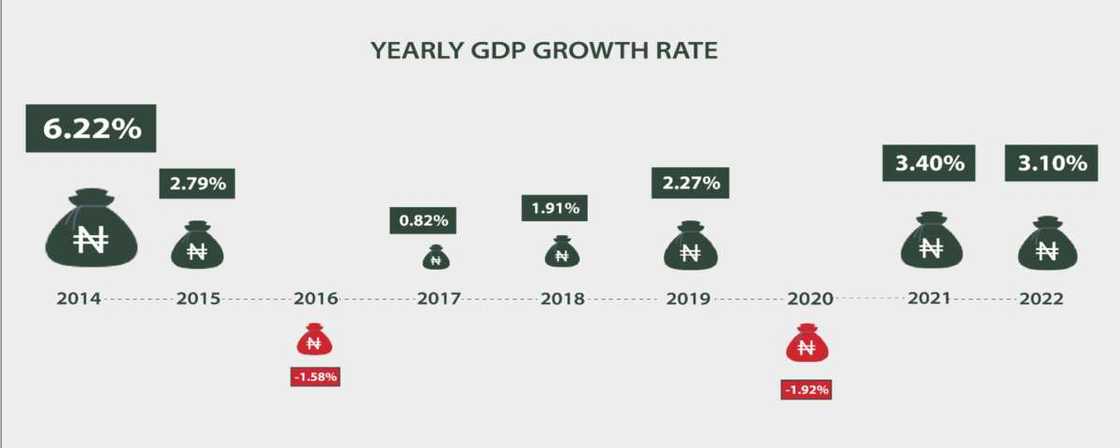Oil, Agriculture Missing: Top 10 Fastest Growing Sectors in Final Phase of Buhari's Administration Emerge
- The NBS has revealed the state of Nigeria's economy after the first three months of 2023 as President Muhammadu Buhari prepares to bow out
- The statistics agency provided details on how sectors in the economy performed amid challenges faced with naira scarcity
- As expected, there was a drop in the economy, but the services sector was the main driver of Nigeria's GDP growth
PAY ATTENTION: Сheck out news that is picked exactly for YOU ➡️ click on “Recommended for you” and enjoy!
The National Bureau of Statistics (NBS) on Wednesday, May 24, 2023, released Nigeria’s Gross Domestic Product (GDP) report for the first quarter of 2023.
GDP measures the total value of all goods and services produced within a country within a given period. It helps provide insights into the size and health of an economy.

Source: Facebook
NBS data from January to March 2023 shows Nigeria’s GDP grew by 2.31% (year-on-year) in real terms.
This is a slow growth or decline compared to the 3.1% GDP growth recorded in the previous year, The Punch reports.
PAY ATTENTION: Share your outstanding story with our editors! Please reach us through info@corp.legit.ng!
How the economy performed in the first quarter
According to the NBS report, the non-oil sector accounted for 93.70% of the aggregate GDP, while the oil sector represented 6.21% of the economy.
NBS also stated that in real terms, Nigeria's GDP stands at N17.75 trillion as of March 2023.
The driving factors of Nigeria's GDP in Q1 2023
Legit.ng further analysis of the data shows that the growth of Nigeria's GDP was primarily driven by the services sector, which recorded an increase of 4.35% and contributed 57.29% to the aggregate GDP.
The agriculture sector, which is the pillar of Buhari's administration and CBN's various interventions, grew in the negative of -0.90%, lower than the growth of 3.16% recorded in the first quarter of 2022.

Read also
Mike Adenuga's net worth now stands at $5.6 billion, while Dangote and Rabiu's wealth remains unchanged
Top 10 fastest-growing sectors in Q1, 2023
Here are the fastest-growing sectors in the Nigerian economy after the first three months of 2023, compared to their performance last year.
- Metal Ores (Mining and Quarrying) - 52.56%
- Financial Institutions (Financial and Insurance) - 24.96%
- Air Transport (Transportation and Storage) - 19.45%
- Telecommunications & Information Services- 11.71%
- Electricity, Gas, Steam, and Air Conditioning Supply - 9.53%
- Information and Communication - 10.32%
- Broadcasting (Information and Communication) - 6.30%
- Water Transport (Transportation and Storage) - 18.44%
- Arts, Entertainment, and Recreation - 5.47%
- Water Supply, Sewerage, Waste Management, and Remediation - 5.57%
10 underperforming sectors in Q1, 2023
- Rail Transport & Pipelines (Transportation and Storage) -49.08%
- Oil Refining (Manufacturing) -35.84%
- Livestock (Agriculture) -30.57%
- Other Services -20.05%
- Insurance (Financial and Insurance) -8.01%
- Administrative & Support Services -4.64%
- Crude Petroleum and Natural Gas (Mining and Quarrying) -4.21%
- Other Manufacturing (Manufacturing) -2.97%
- Textile, Apparel and Footwear (Manufacturing) -3.68%
- Fishing (Agriculture) -2.92%
Nigeria’s debt hits N49 trillion, becomes 5th most indebted African country to China
Legit.ng reported that by the time President Muhammadu Buhari exits office on May 29, 2023, he will be leaving a mountain of debt pegged at about N49.93 trillion, covering external and domestic debt.
The amount is nearly 300% higher than the debt he met in 2015. Nigeria’s total debt portfolio now stands at about N49.93 trillion, with the government borrowing N3.73 trillion in the last two months.
Data indicates that the Nigerian government raised N1.599 trillion in the fourth quarter of last year.
Source: Legit.ng




